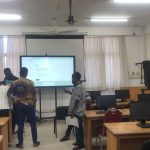Professor of Anthropology and Senior Fellow at the Merian Institute for Advanced Studies in Africa at the University of Ghana, Laure Carbonnel has stated that music as a universal language must be seen beyond just the value of entertainment particularly because it is a very important tool in promoting culture across different societies and fosters a sense of togetherness.
The call comes on the back of the Institute holding its fourth Public lecture for the academic year as parts of its activities to promote knowledge and information dissemination .
The theme for the lecture was “ Moving together, From mobility between cities to the dancefloor ; The fabric of trasnational collection of festivities with a focus on Accra’s creative economy.
The public lectures are designed by the Institute to create a platform for the scholars and resident Senior Research Fellows to produce relevant research topics in their fields of expertise to broaden knowledge sharing amongst the academic community.
Speaking at the event, the Lead Researcher and Professor of Anthropology, Laure Carbonnel intimated that music as a universal language is a key components of preserving culture and providing a sense of belonging to citizens of countries whenever they find themselves in new environments.
” Beyond the hustle and bustle of moving between cities across the globe and the continent of Africa, music is a powerful tool which promotes a sense of belonging in many societies , the various rhythms and fusion of various cultural components identical to a group of people to be able to feel comfortable in new environments whether home or abroad.
Music is a cross cultural tool to bring together non citizens and citizens in one space to interact and share ideas across various cultures which can interrelate with one another basically for relaxation and enjoyment but also to serve as a bridge of identity in many societies as well”.
Also, Professor Carbonnel added that even though music is composed in different languages with underlying interrelations to bring about a sense of belonging in social groups , it is also a tool to educate foreigners in new countries how important culture is to the daily lives of local citizens.
Societies have different uses for music not only as a means of entertaining themselves but also plays a critical role of helping music creators in providing economic value that promotes sustainable development across board for universal benefits.
” Music as a key component of building the identity of many social groups across both national and geographical barriers has so many sub divisions which focuses on the art of music, the economical viability of music as a business which goes beyond the original composers and to appeal to international audience and creates overlapping linkages to unite cross cultural similarities as well.
The commercial viability of music as a tool of change and geopolitical processes makes it interesting to appreciate the roles of music creatives like disc jockeys and organizers of music themed activities across business , social and cross cultural exchanges and also traditional festivals symbolic to certain traditions of countries makes it easier to break modern barriers of time , geographical limitations and ,language limitations to build up long lasting interrelations of culture in a fast changing and globally complicated world of economic might , power play of powerful nations and the need to unite for a common purpose through the subtle diplomacy of a common denominator – the message behind the composition of songs “.




